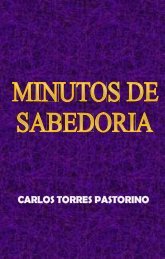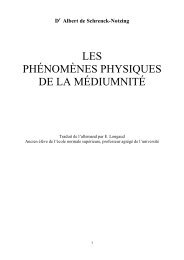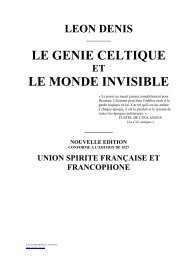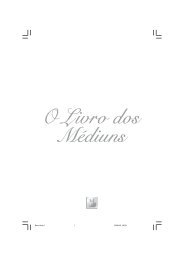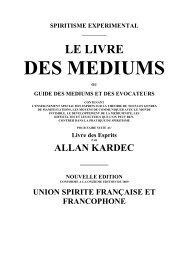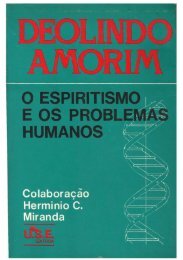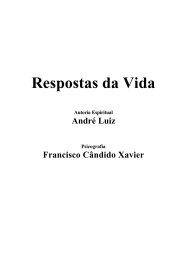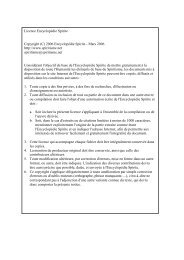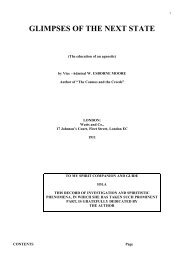Experimental investigation of the spirit manifestations, [electronic ...
Experimental investigation of the spirit manifestations, [electronic ...
Experimental investigation of the spirit manifestations, [electronic ...
- No tags were found...
Create successful ePaper yourself
Turn your PDF publications into a flip-book with our unique Google optimized e-Paper software.
252 INFLUENCE OF SCRIPTUREmaining; that <strong>the</strong> ^renter part Avcrc only Christians in name, and worse than <strong>the</strong> harhariansin life and conversation.1299. In <strong>the</strong> sixth century, toward <strong>the</strong> close, we sec Pope Gregory <strong>the</strong> Great attributingall <strong>the</strong> public, calamities to <strong>the</strong> ambition <strong>of</strong> <strong>the</strong> bishops, who concealed <strong>the</strong> teeth <strong>of</strong>Avolvcs under <strong>the</strong> face <strong>of</strong> sheep,l.nOO. " The seventh century. Wo begin to see <strong>the</strong> fruits <strong>of</strong> clerical celibacy in <strong>the</strong> ruleestablished by <strong>the</strong> council <strong>of</strong> Toledo, that <strong>the</strong> illegitimate children <strong>of</strong> <strong>the</strong> clergy, from <strong>the</strong>bishop down to <strong>the</strong> sub-deacon, should be slaves in <strong>the</strong> church where <strong>the</strong>ir fa<strong>the</strong>rs served.It is to be presumed that this canon was intended to discourage and amend <strong>the</strong> incontinence<strong>of</strong> <strong>the</strong> clergy, but <strong>the</strong> adoption <strong>of</strong> such an extraordinary law proves i)lainly <strong>the</strong>prevalence <strong>of</strong> <strong>the</strong> evil. So general had <strong>the</strong> worldlincss <strong>of</strong> <strong>the</strong> clergy becctme, that in <strong>the</strong>latter part <strong>of</strong> this century <strong>the</strong> most eminent bishops <strong>of</strong> France took great part in politicalmatters, and in time <strong>of</strong> war marched at <strong>the</strong> head <strong>of</strong> <strong>the</strong>ir troops, like <strong>the</strong> lay barons.1301. One '*' <strong>of</strong> <strong>the</strong> most im])ortant events <strong>of</strong> <strong>the</strong> eighth century was <strong>the</strong> forgery <strong>of</strong> <strong>the</strong>Decretals, by which all <strong>the</strong> primitive bishops <strong>of</strong> Rome, from Clement to Sylvester, weremade to utter <strong>the</strong> most extravagant doctrines concerning <strong>the</strong> j)Ower <strong>of</strong> <strong>the</strong> pope, <strong>the</strong> supremacy<strong>of</strong> Home, and <strong>the</strong> authority to judge <strong>the</strong> o<strong>the</strong>r bishops, while <strong>the</strong> pope himselfcould be judged by none. Yet such was <strong>the</strong> ignorance <strong>of</strong> <strong>the</strong> times, that this forgery wassuccessful tiiroughout <strong>the</strong> whole Latin Church, and remained unquestioned for eighthundred years toge<strong>the</strong>r. Ano<strong>the</strong>r strong pro<strong>of</strong> <strong>of</strong> this prevailing ignorance is found in<strong>the</strong> course <strong>of</strong> <strong>the</strong> bishops at <strong>the</strong> second council <strong>of</strong> Nice, where pretended miracles performedby images were cited from false documents without any suspicion <strong>of</strong> mistake.1302. "The parliament <strong>of</strong> "Worms presented to <strong>the</strong> emperor a request from all <strong>the</strong> peoplethat <strong>the</strong> bishops should no longer go out at <strong>the</strong> head <strong>of</strong> <strong>the</strong>ir troops, but should stay in<strong>the</strong>ir dioceses and assist <strong>the</strong> army by <strong>the</strong>ir prayers; and Charlemagne willingly granted <strong>the</strong>petition. But it is remarkable that this application came not from <strong>the</strong> clergy, but from <strong>the</strong>laity ;and it was so little regai'ded afterward, that we shall find some warlike bishops evenamong <strong>the</strong> popes <strong>the</strong>mselves. This same emperor endeavoured with great zeal to purify<strong>the</strong> morals <strong>of</strong> <strong>the</strong> clergj--; and his repro<strong>of</strong>s <strong>of</strong> <strong>the</strong>ir worldlincss, <strong>the</strong>ir avarice, and <strong>the</strong>irprostitution <strong>of</strong> sacred things for <strong>the</strong> sake <strong>of</strong> gain, are remarkable monuments <strong>of</strong> his owngood sense and <strong>of</strong> <strong>the</strong> corruption which infested <strong>the</strong> church in <strong>the</strong> ninth century. Afterhis death, which occurred in A. D. 814, some churches invoked him as a saint, notwithstandinghe had four wives and five concubines.1303. ''The year S-li was signalized by <strong>the</strong> introduction <strong>of</strong> false relics at Dijon inFrance, by which, never<strong>the</strong>less, several remarkable cures Avere supposed to have beeneffected, until <strong>the</strong> fraud was discovered; but <strong>the</strong> proceedings show that such impostureswere common. In A., d. 850 a poor presbyter named Go<strong>the</strong>schalk, who had adopted highviews on predestination, was not only deposed from <strong>the</strong> priesthood, but afterward publiclywhipped, as an incorrigible heretic, and cast into prison, where he died after eighteenyears' conlinement. Yet his doctrine Avas defended by o<strong>the</strong>r bishops <strong>of</strong> high rei)utation,and his punishment was denounced as cruel and unjust.1301. 'Mn A.]). 864, a violent outrage took place at Rome, in which Gonthier, <strong>the</strong>Archbishop <strong>of</strong> Cologne, protesting against <strong>the</strong> judgment <strong>of</strong> Pope Nicholas, tohl hisbro<strong>the</strong>r Ilildwin, who was a priest, to place his protestation on <strong>the</strong> tomb <strong>of</strong> Saint Peter:that is, upon <strong>the</strong> altar <strong>of</strong> <strong>the</strong> church. Accordingly, Ilildwin entered into <strong>the</strong> churchwith several followers, all armed, and as <strong>the</strong> keepers opposed him, he rei>ulsed <strong>the</strong>m withblows, and killed one <strong>of</strong> <strong>the</strong>m upon <strong>the</strong> spot. He <strong>the</strong>n accomplished his purpose, and retreatedsword in hand. The anecdote is only <strong>of</strong> importance as a pro<strong>of</strong> <strong>of</strong> <strong>the</strong> <strong>spirit</strong> <strong>of</strong> <strong>the</strong>age. The first instance <strong>of</strong> a partial interdict occurs in A. D. 871. The ordeals <strong>of</strong> boilingwater, cold water, and red-hot iron were employed in this age, to determine questions <strong>of</strong>justice under <strong>the</strong> auspices <strong>of</strong> <strong>the</strong> priests; and even kings employed <strong>the</strong>m, with all faithand confidence. The Duke <strong>of</strong> Naples had formed an alliance with <strong>the</strong> Saracens, which<strong>the</strong> pope disproved; and as he refused to break it on <strong>the</strong> order <strong>of</strong> <strong>the</strong> pontifi", he was excommunicated.The Bishop Athanasius, who was <strong>the</strong> duke's own bro<strong>the</strong>r, took him andput out his eyes, sent him as prisoner to Rome, and caused himself to be proclaimed Duke<strong>of</strong> Naples in his place. The pope approved this conduct highl}-, and praised <strong>the</strong> bishop forloving God more than his bro<strong>the</strong>r, and putting out <strong>the</strong> right eye which had <strong>of</strong>i'ended,according to Scripture. This pontitf was John YIII., and <strong>the</strong> time was A. D. 877.Reasons for not proceeding far<strong>the</strong>r withQuotation <strong>of</strong> Details.1305. It would occupy too much space, and make too wide a digression,were I to proceed in quoting <strong>the</strong> details <strong>of</strong> <strong>the</strong> evidence showing <strong>the</strong> state<strong>of</strong> morals in Christendom during <strong>the</strong> Middle Ages to have been much belowthat which <strong>the</strong> hea<strong>the</strong>n displayed during <strong>the</strong> period immediately succeeding<strong>the</strong> advent <strong>of</strong> Christ, according to Mosheim and Gibbon. But




